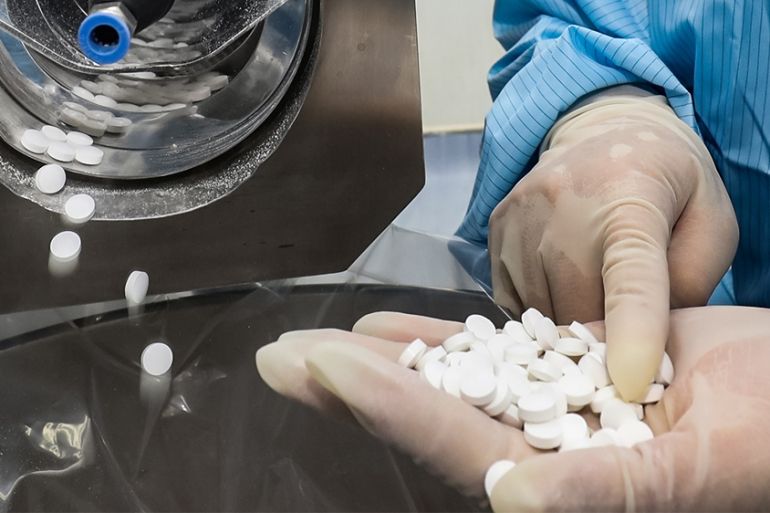Doctor’s Note: Can chloroquine and other drugs treat coronavirus?
A doctor examines the evidence for chloroquine, remdesivir and some HIV drugs.

This week, we heard that a man in Arizona had died from taking the drug chloroquine after President Donald Trump claimed it had been approved for use in treating coronavirus.
“We’re going to be able to make that drug available almost immediately,” Trump proclaimed at a news conference on March 19.
Keep reading
list of 4 itemsDoctor’s Note: How to look after your mental health
Doctor’s Note: Can herd immunity solve coronavirus?
Doctor’s Note: Coronavirus and those with weakened immune systems
Two days later, he tweeted to his 75 million followers (a population the size of Turkey) that chloroquine had “a real chance to be one of the biggest game changers in the history of medicine”.
Unfortunately, this was not entirely true. The United States Food and Drugs Administration (FDA), which is in charge of licensing drugs, clarified the situation, saying it has not approved chloroquine or, indeed, any drugs at all to fight COVID-19.
Sadly, it was too late for the man in Arizona and his wife, who remains critically ill in hospital after taking chloroquine phosphate – usually used to clean fish tanks – in a desperate bid to avoid contracting the virus.
So, where has this information about chloroquine come from and is it true?
The race is on to find a drug that effectively and safely treats patients who have contracted COVID-19. Rather than come up with new drugs from scratch, scientists are looking at existing drugs that have been used to treat similar viruses in the past such as middle eastern respiratory syndrome (MERS) and severe acute respiratory syndrome (SARS).
Chloroquine
Chloroquine, which has long been used to treat malaria, is one of the drugs currently being studied.
However, it has been around so long that the parasite which causes the majority of malaria cases has now become resistant to it and it is no longer recommended for use in most countries. It is also used to treat rheumatoid arthritis and lupus.
Chloroquine has been shown in laboratory tests, involving viruses in test tubes only, to help reduce the spread and reproduction of other types of coronaviruses, however, tests on animals have so far proved unsuccessful.
A Chinese study, published this month in Nature, one of the world’s leading scientific journals, suggested that when tested on more than 100 patients, chloroquine had superior results when compared with a control drug (a drug known to have no effects on the virus, used for comparison purposes) “in inhibiting the exacerbation of pneumonia, improving lung imaging findings, promoting a virus negative conversion, and shortening the disease course”.
This would be the first successful use of chloroquine in humans for the treatment of an acute viral disease, albeit not specifically COVID-19, which is good news if true.
However the authors of the study have not yet provided their raw data for peer review and this should be considered carefully before any announcements are made, especially by the US president.
It is also worth noting that this drug can have some serious side effects, including depression, hair loss, stomach upset and headaches to name a few. Therefore, it must be taken under the supervision of a doctor.
|
|
Remdesivir
Another drug being looked into is Remdesivir, which was used during the Ebola epidemic without much success. This drug is designed to slow down the infection of healthy cells by blocking viral replication.
However, a study by the University of North Carolina, Chapel Hill, showed in test tube and animal studies that the drug can inhibit the coronaviruses that cause SARS and MERS.
Furthermore, a case report published in The New England Journal of Medicine showed how the first patient with COVID-19 in the US – a young man – showed significant improvement in his symptoms within hours of taking the drug, as did a severely ill patient in California.
However, these are single cases, and the World Health Organization (WHO) has urged caution until more trial data is available.
Although promising, it is worth noting that this drug needs to be given intravenously – via injection into a vein – and is relatively expensive.
HIV drugs
As well as these drugs, the WHO is fast-tracking research into some HIV drugs – Ritonavir and Lopinavir – which have not shown promising results so far in smaller studies. These drugs work by blocking enzymes inside the virus and reducing its capacity to invade human cells and replicate.
The bottom line is that more research is needed before we can draw any definite conclusions about effective treatments or even a cure for COVID-19.
Therefore, people should not take any of these drugs – in whatever form they come in – unless instructed to do so by a qualified doctor.
We are relying on the world’s scientists to not only come up with treatment but also a vaccine. This will take time. In the meantime, we must stick to the rules about hygiene, self-isolation and social distancing.